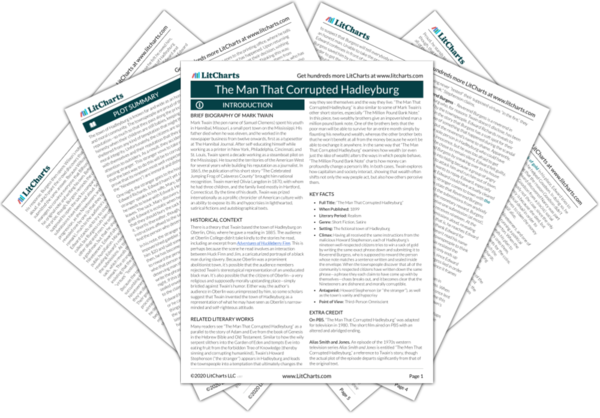Barclay Goodson Quotes in The Man That Corrupted Hadleyburg
At this stage—or at about this stage—a saying like this was dropped at bedtime—with a sigh, usually—by the head of each of the nineteen principal households: “Ah, what could have been the remark that Goodson made?”
And straightaway—with a shudder—came this, from the man’s wife:
“Oh, don’t! What horrible thing are you mulling in your mind? Put it away from you, for God’s sake!”
But that question was wrung from those men again the next night—and got the same retort. But weaker.
And the third night the men uttered the question yet again—with anguish, and absently. This time—and the following night—the wives fidgeted feebly, and tried to say something. But didn’t.
And the night after that they found their tongues and responded—longingly:
“Oh, if we could only guess!”

Unlock explanations and citation info for this and every other The Man That Corrupted Hadleyburg quote.
Plus so much more...
Get LitCharts A+Had he rendered that service? Well, here was Goodson’s own evidence as reported in Stephenson’s letter; there could be no better evidence than that—it was even proof that he had rendered it. Of course. So that point was settled…. No, not quite. He recalled with a wince that this unknown Mr. Stephenson was just a trifle unsure as to whether the performer of it was Richards or some other—and, oh dear, he had put Richards on his honor!
[…] Further reflection. How did it happen that Richards’s name remained in Stephenson’s mind as indicating the right man, and not some other man’s name? That looked good. Yes, that looked very good. In fact, it went on looking better and better, straight along—until by and by it grew into positive proof. And then Richards put the matter at once out of his mind, for he had a private instinct that a proof once established is better left so.

Barclay Goodson Quotes in The Man That Corrupted Hadleyburg
At this stage—or at about this stage—a saying like this was dropped at bedtime—with a sigh, usually—by the head of each of the nineteen principal households: “Ah, what could have been the remark that Goodson made?”
And straightaway—with a shudder—came this, from the man’s wife:
“Oh, don’t! What horrible thing are you mulling in your mind? Put it away from you, for God’s sake!”
But that question was wrung from those men again the next night—and got the same retort. But weaker.
And the third night the men uttered the question yet again—with anguish, and absently. This time—and the following night—the wives fidgeted feebly, and tried to say something. But didn’t.
And the night after that they found their tongues and responded—longingly:
“Oh, if we could only guess!”

Unlock explanations and citation info for this and every other The Man That Corrupted Hadleyburg quote.
Plus so much more...
Get LitCharts A+Had he rendered that service? Well, here was Goodson’s own evidence as reported in Stephenson’s letter; there could be no better evidence than that—it was even proof that he had rendered it. Of course. So that point was settled…. No, not quite. He recalled with a wince that this unknown Mr. Stephenson was just a trifle unsure as to whether the performer of it was Richards or some other—and, oh dear, he had put Richards on his honor!
[…] Further reflection. How did it happen that Richards’s name remained in Stephenson’s mind as indicating the right man, and not some other man’s name? That looked good. Yes, that looked very good. In fact, it went on looking better and better, straight along—until by and by it grew into positive proof. And then Richards put the matter at once out of his mind, for he had a private instinct that a proof once established is better left so.











